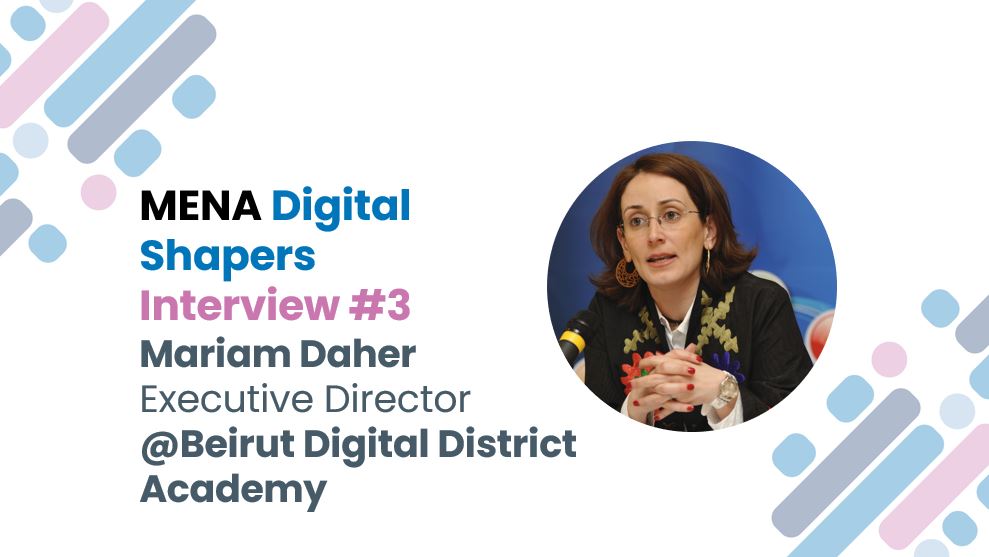Digital Shapers # 3

Interviewee Mariam Daher, Executive Director
Company Beirut Digital District (BDD) Academy
Industries Education, technology
Headquarters Beirut, Lebanon
About BDD Academy
In 2018, Beirut Digital District (BDD) launched the BDD Academy to address the talent gap in Lebanon. BDD Academy aims to develop the skillset of people from all backgrounds to fulfill the digital jobs of today and tomorrow. It supports the new generation of educational programs in testing and developing their curriculum, sourcing participants, fundraising and scaling.
BDD Academy is an incubator of educational programs. It is currently the implementing agency of the World-Bank funded Skilling Up Lebanon (SUL) project.
In this context, Euromena Consulting is delighted to contribute to SUL by participating in programmatic efforts aimed at bridging the gap between talent and economic opportunities in Lebanon.
- What is Skilling Up Lebanon and what are your aspirations for this program?
With the advancements in technologies continuing to have an increasingly significant impact on jobs in the coming years and decades, the Skilling up Lebanon (SUL) project comes to attempt to address this substantial shift in the labor market. SUL is a one-year World Bank-funded project, aiming to equip 700 young people residing in Lebanon with market-relevant digital skills, to enhance their chances of getting employed.
- What are the priorities for this year? Beyond 2022?
The main priorities for the year 2022 are about implementing the 5 pilot programs which are planned under this project, and which are related to:
- Offering career guidance to around 500 high school students, to raise awareness about the changes in the jobs of the future, and to help them assess their strengths in order to choose the right career path
- Offering an internship opportunity for 150 young people including undergraduate and freshly graduates
- Developing and running 3 digital skills pilot programs, each one tackling a digital skill that is highly demanded in the market. The skills will be decided further to an extensive market digest exercise run with the local Lebanese employers
- What are the major hurdles that the private sector is facing when it comes to bridging the [tech] talent gap?
We are, at the moment, running a market digest exercise with the major employers in the digital sector in Lebanon, for us to understand their needs and their challenges. This exercise will help in developing the training programs which can in one way, or another answer these needs. Based on some initial discussions, one of the major issues is related to the fact that university education is not capable of keeping up with the pace of advancements in technology. Many digital skills are required in the labor market, with these not taught at universities. This means that the private employer will have to spend time and effort to get these young graduates into programs that equip them with the skills needed. In addition to this, soft skills development is an area where the private sector invests in, to equip the young graduates with the necessary skills needed to work professionally. Finally, there is the issue of instability in the country at all levels, including the travel of the youth.
- At a time when the education sector faces major challenges, how can Lebanese youth keep up to date with tech trends shaping our daily lives?
This is a bit challenging especially with the financial crisis the country is going through. As you may be aware the majority of the training related to the enhancement of market-relevant digital skills can be available online, or in hybrid mode. The costs might be substantially high. And this is where projects like SUL come to help these young people, by subsidizing the cost of these certificates. With education being more accessible, young people who have the right competencies and desire to embark in a digital career can self-develop by acquiring the skills needed for the labor market.
- How can the wider community contribute to and support this effort?
There are a few things which the wider community could support with. This starts with a change in the mindset, accepting to move from the traditional career path which we have been used to for ages. That doesn’t mean that lawyers, doctors, etc. won’t be needed. However, there is a full range of new career paths which need to be considered to achieve sustainable economic growth. Having said that, there might also be a shift towards certified graduates rather than university graduates and the community needs to be able to cope with this shift. In addition, it is becoming evident that the Lebanese are being able to sustain based on personal efforts and/or initiatives offered by the private sector. That means that maybe more funds need to be solicited from the private sector and the wider communities to sustain education initiatives. Private employers might need to provide more opportunities for both short- and long-term internships. They might also need to promote different programs across their reach to maximize access, using portals to post jobs so that various stakeholders could follow on market trends.